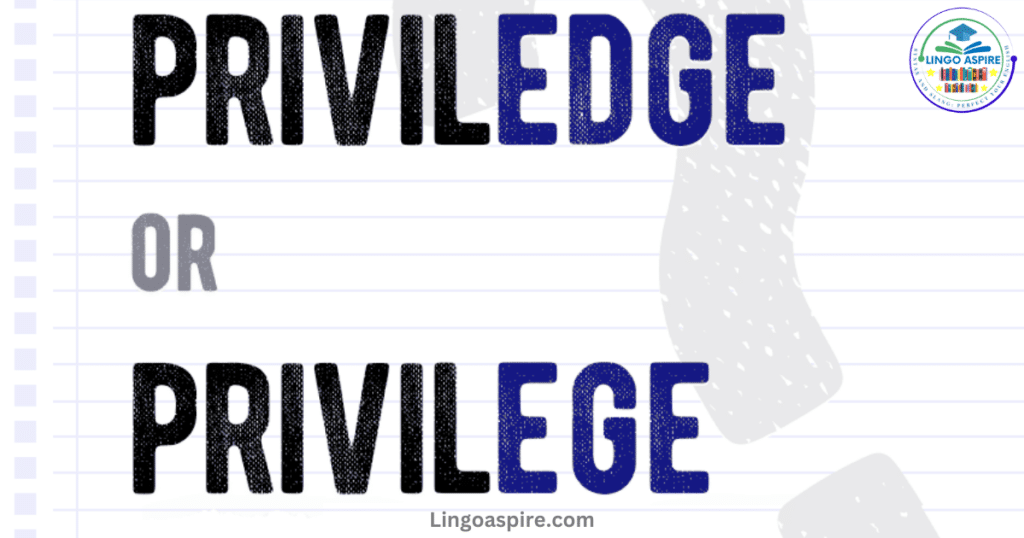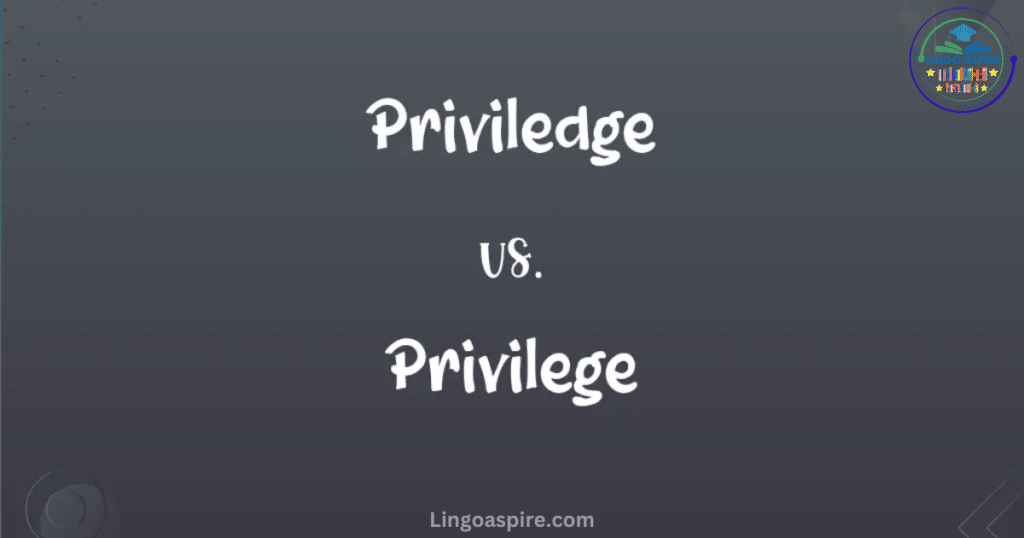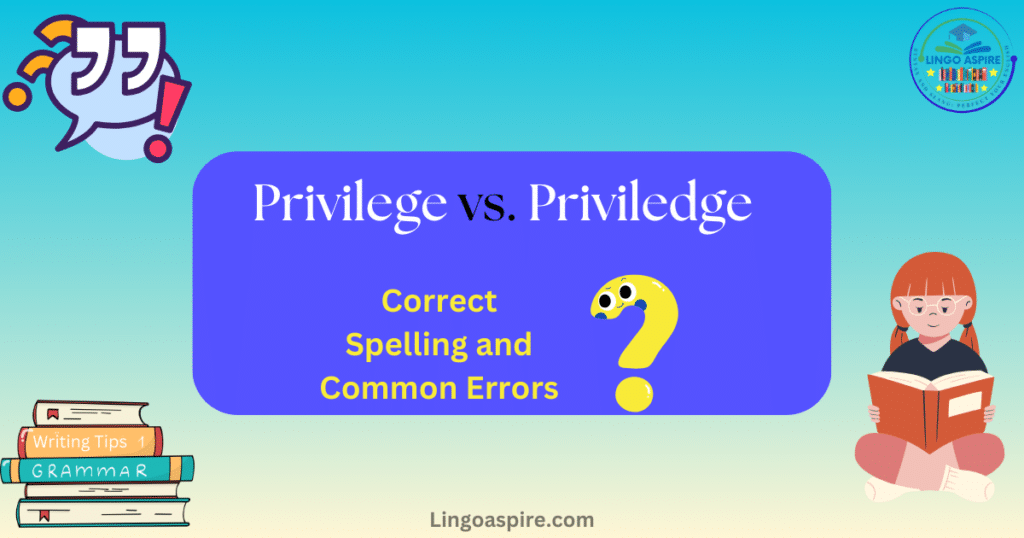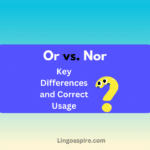Spelling plays a critical role in effective communication, especially in written English. One word that often confuses writers is “privilege.” Many mistakenly spell it as “priviledge,” but only one of these is correct. In this article, we’ll dive deep into the correct spelling, its meaning, usage, and how to avoid common mistakes. Understanding these details will improve your grammar and help you write confidently.
Privilege vs. Priviledge: Which Is Correct?

The correct spelling of privilege is “privilege,” without the extra “e.” The word “priviledge” is a common misspelling that often occurs because of its pronunciation. Despite how it sounds, the word does not include an “e” after the “l.” The meaning of privilege refers to a special right, advantage, or benefit given to a person or group.
This term originates from the Latin word privilegium, meaning “a law for or against an individual.” Over time, it evolved into Middle English and retained its original essence. The misspelling “priviledge” likely arises because of the way English speakers stress certain syllables. However, it’s essential to use the correct English spelling to maintain professionalism in writing.
How to Spell “Privilege” Correctly
To remember the correct spelling of privilege, think of the root word “privilegium.” This helps you focus on the correct structure without adding extra letters. Breaking it down phonetically also helps: “priv” + “i” + “lege.” Many spell-check tools, such as Grammarly and ProWritingAid, can catch errors like “priviledge.” Using such tools ensures you avoid common privilege spelling mistakes in both casual and formal writing.
When in doubt, practice writing the word in different privilege usage examples. For instance, “Having access to education is a privilege, not a right.” Repetition and context can help you master the correct spelling.
| Correct Spelling | Incorrect Spelling |
|---|---|
| Privilege | Priviledge |
| Privileged | Priviledged |
Privilege vs. Priviledge
The word “privileged” is the adjective form of “privilege.” It describes someone who has received special rights or advantages. For example, “She felt privileged to attend such a prestigious event.” Notice how the base word “privilege” remains intact, even when modified.
Confusion often arises when distinguishing privileged vs. privilege. The first is an adjective, while the second is a noun. Practicing their usage in sentences will clarify the difference. For instance, “It is a privilege to help others” uses the noun form, while “We are privileged to have access to clean water” uses the adjective form.
Examples of Privilege in Sentences
Using “privilege” correctly in sentences is key to writing clearly. Here are some privilege examples to guide you:
- “The scholarship is a privilege awarded to only the top students.”
- “Living in a free society is a privilege we often take for granted.”
- “He was given the privilege of speaking first at the conference.”
In each example, the word emphasizes a special right or benefit. Practicing sentence examples for privilege in your writing helps embed the correct usage in memory.
Common Misspellings of priviledge
Misspelling “privilege” is more common than you might think. Below are some frequent errors and the reasons behind them:
| Misspelling | Reason |
|---|---|
| Priviledge | Confusion with pronunciation, dropping the “i” after “priv” |
| Privelege | Phonetic spelling errors, misplacing vowels |
| Privilage | Misplacing vowels, confusion with the sound of the word |
These errors often result from assumptions about English pronunciation rules. To avoid these mistakes, consider creating flashcards or using online spell checkers that highlight such errors.
Correct usage of Privilege vs. Priviledge

Why “Privilege” Is Correct
The word “privilege” originates from the Latin term privilegium, meaning a “special right or law granted to an individual.” Over time, the English adaptation retained the correct spelling as “privilege.” This spelling is universally accepted in dictionaries like Merriam-Webster and Cambridge, as well as in formal English writing.
On the other hand, “priviledge” is not a recognized word in English. The addition of the extra “e” results from common mistakes in phonetics, where people incorrectly assume the second syllable should sound like “ledge.” However, this is incorrect, as the correct pronunciation is “priv-uh-lij” or “priv-lij” (depending on regional accents).
Proper Usage in Writing
You should always use “privilege” in any form of writing, whether informal or formal. For example:
- Correct: It is a privilege to address the audience today.
- Incorrect: It is a priviledge to address the audience today.
Why Spelling Matters
Using “privilege” correctly demonstrates a strong command of grammar and attention to detail, especially in professional or academic settings. Misspelling the word as “priviledge” could undermine credibility and make the writing appear unpolished.
Real-World Context
- In legal documents, “privilege” is commonly used to refer to rights or advantages, such as “attorney-client privilege.”
- In day-to-day language, it often signifies a special opportunity or honor, such as “It was a privilege to meet her.”
Key Tip: Double-check your spelling using tools like Grammarly or refer to trusted dictionaries to avoid the mistake of writing “priviledge.” Always proofread, as even experienced writers can fall prey to such errors!
Tips to Avoid Spelling Mistakes
To prevent privilege spelling mistakes, follow these grammar and spelling tips:
- Use reliable tools like Grammarly or ProWritingAid to catch errors.
- Practice writing the word in multiple sentences.
- Memorize its Latin root, “privilegium,” to understand its structure.
- Proofread your work thoroughly, paying attention to commonly misspelled words.
- Create a personal word list for tricky terms like “privilege.”
These steps will help you build confidence and improve your writing.
FAQs About Privilege vs. Priviledge
Why is “privilege” often misspelled as “priviledge”?
The misspelling occurs because the pronunciation suggests an extra “e” after the “l.” This confusion is common in English, where spelling doesn’t always match pronunciation.
Is “priviledge” ever correct?
No, “priviledge” is never correct. It is always a misspelling.
How can I remember the correct spelling of “privilege”?
Think of the word “privilege” as “private law” (from its Latin root), which can remind you of its proper structure.
Conclusion
Understanding the difference between privilege vs. priviledge is essential for clear and professional communication. By mastering the correct spelling of “privilege,” using tools for accuracy, and practicing frequently, you’ll eliminate common errors and enhance your writing skills. Remember, spelling is more than just a technicality—it reflects your attention to detail and commitment to quality. So, take the time to learn, practice, and confidently write.
Sources
- Merriam-Webster Dictionary
- Official source for the definition of “privilege”, examples, and its correct usage.
- Cambridge Dictionary
- Offers clear explanations, grammar tips, and examples for correctly spelling and using “privilege.”
- Grammarly Blog
- Provides insights on common spelling mistakes like “priviledge vs. privilege” and tips for writing correctly.







